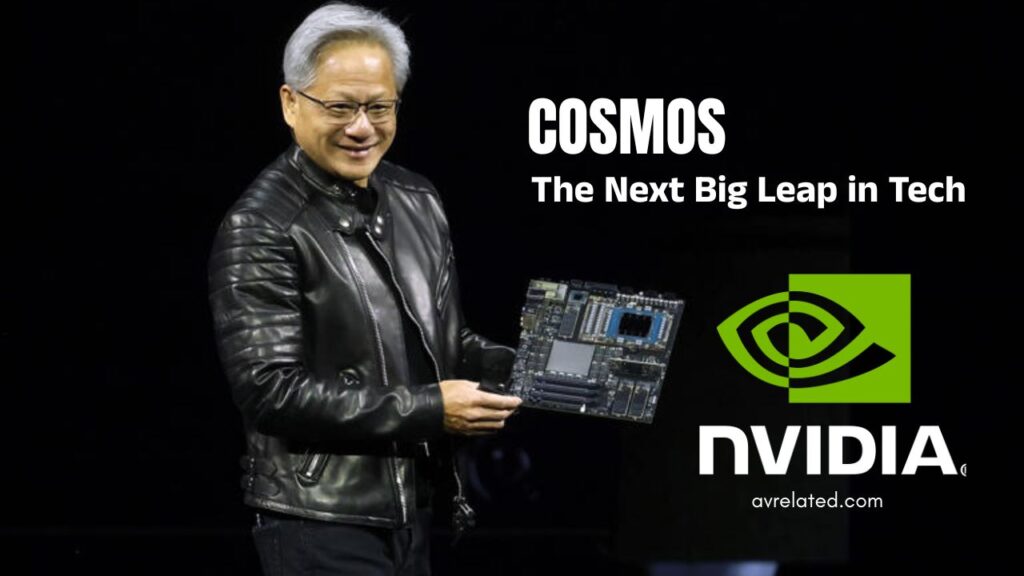If you follow technology even casually, you would have noticed that NVIDIA is not just about graphics cards anymore. Over the last few years, they have quietly moved into almost every big area of tech — AI, data centres, robotics, autonomous driving, and more. Now, with COSMOS, they seem to be preparing something that could impact multiple industries at once.
COSMOS is not a simple software or a single AI model. It’s more like a huge platform that can simulate, test, and visualise complex systems in a virtual space. Think of it as creating a “digital twin” of almost anything — a city, a car, a factory, or even a complicated event setup — and running real-time experiments on it without touching the real world.

Why is that a big deal? Because in technology, the cost of testing directly in the real world is often very high. You can’t just shut down a city’s traffic system to check a new AI traffic control algorithm. You can’t rebuild a stadium again and again to test where the speakers and cameras should be placed. With COSMOS, you don’t have to. You create the exact copy in the virtual space, feed it real data, and test as many variations as you want.
The global applications are endless. In autonomous driving, for example, cars need to be trained for millions of scenarios — rainy weather, sudden pedestrian crossing, unusual road layouts. Doing this physically takes years and is dangerous. In COSMOS, these situations can be recreated in minutes, tested thousands of times, and improved until the AI learns the right responses.
In smart manufacturing, companies can design entire assembly lines virtually, check how machines interact, and fix problems before the first real machine is installed. This saves time, money, and avoids production delays. For space exploration, agencies could simulate spacecraft landings, test robot movements on rough terrain, and predict equipment wear without sending expensive prototypes to space first.
Even in the audiovisual (AV) and entertainment industry, the potential is massive. Imagine a global concert tour where each venue is different — some indoor arenas, some open-air stadiums. Right now, event planners do a lot of guesswork and last-minute adjustments. With COSMOS, the entire show can be designed and rehearsed virtually for each venue, including lighting, camera positions, audio balance, and audience movement. That means smoother shows and better experiences for people attending in person or watching online.
What makes COSMOS powerful is its integration with NVIDIA’s AI and GPU technology. This allows it to process huge amounts of real-world data and render highly realistic simulations. The more accurate the simulation, the more reliable the decisions made from it. And when such a tool becomes widely available, industries can move from reactive planning to predictive planning — solving problems before they even happen.
Of course, there are challenges. For COSMOS to work at full scale, it needs high-quality real-world data. If the input data is incomplete or outdated, the simulation results will not match reality. Also, industries will need skilled teams who can understand both the technical and practical sides of simulation. It’s not a magic button — it’s a powerful tool that works best in the right hands.
But looking at the direction technology is going, it feels like this is a natural next step. We already use AI for recommendations, automation, and design. COSMOS is simply bringing all that into a virtual environment where everything can be tested and improved before touching the real world. For AI enthusiasts, this is like giving machine learning models a high-speed practice ground. For tech enthusiasts, it’s like watching the digital and physical worlds merge in real time.
If it delivers on its promise, COSMOS might change how we build cities, launch products, manage events, train robots, and even plan space missions. And honestly, it’s rare to see a single platform with the potential to influence so many different areas. That’s why people in the tech world are watching it very closely — and why, in the coming years, we might be talking about COSMOS the same way we talk about the internet or smartphones today.